Wikipedia – The Free Encyclopedia

With over 40M articles and 15 billion page views, Wikipedia is the fifth-most popular website in the world. With an editorial community of 75,000, Wikipedia has maintained a hierarchical structure to ensure the quality of content. Managed by a non-profit organization and providing content to its readers for free, how is Wikipedia sustaining itself?
Wikipedia is the first word that comes to mind when you say crowdsourcing. With over 40M[1] articles and 15+ billion page views[8], Wikipedia is the fifth-most[2] popular website in the world.
In a highly productive community of collaborative authorship, individuals voluntarily contribute to an open-content encyclopedia by adding new content and revising work submitted by others.
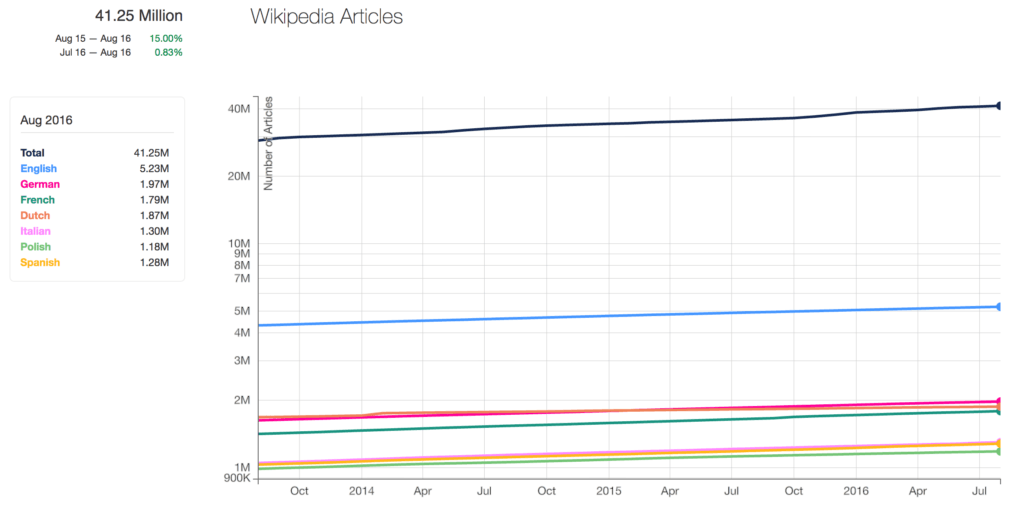 Figure 1: Number of Wikipedia articles [1]
Figure 1: Number of Wikipedia articles [1]
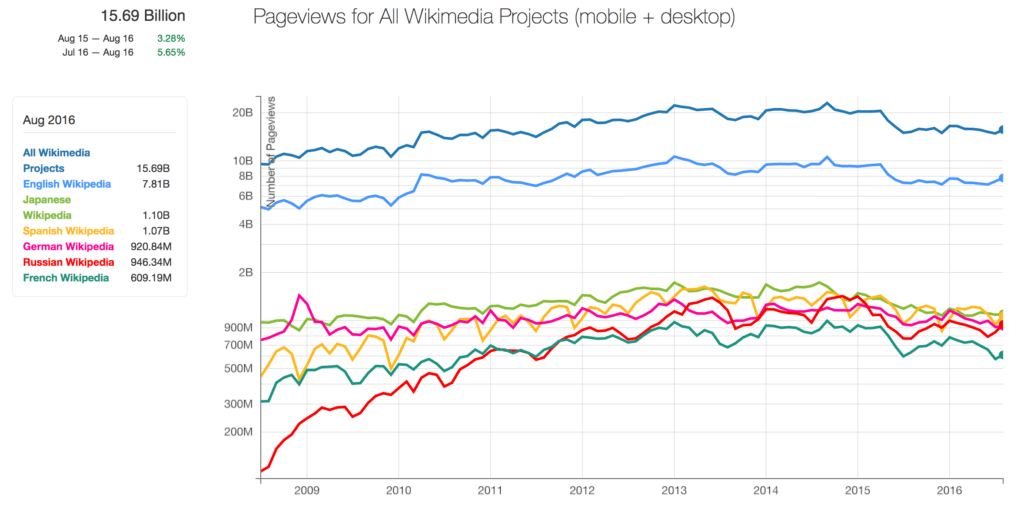
Crowd and incentive management
Individual contributors toWikipedia are known as ‘Wikipedians’. The English Wikipedia currently has 140,250 active editors (who have performed an edit in the last 30 days), 50% of whom spend at least one hour a day editing, and a fifth spend more than three hours a day[3]
What motivates people to contribute toWikipedia? For mostWikipedia contributors, it’s about the respect and recognition they receive in the community[4]. Unlike scientific publications, Wiki does not give direct credit to the authors. Further, articles are typically edited by multiple people multiple times. TheWikipedia authors community still recognize your contribution. Contributors also, at times, claim ownership by putting the link to theirWikipedia article on their pages, or including them in their ‘resume’ thereby helping themselves professionally.
For some, it’s a fun activity to share knowledge, learn about a topic in order to write aWikipedia page about it[5]. Putting information onWikipedia helps keep it organized and at one place, and thus contributes to the bigger cause of spreading the information in the world.
Reputed and credibleWikipedia editors become administrators and are able to freeze or delete entries, especially when edit wars erupt or inappropriate changes are applied. Administrators can be overruled by 36 stewards[6][7], who are ultimately responsible for resolving such matters. This hierarchical model becomes a necessary evil when anyone can freely share knowledge and ensures consistency and sanctity of information on Wikipedia.
Value creation and value capture
Value creation
Wikipedia is essentially an encyclopedia, where users come to acquire knowledge. MostWikipedia articles are written objectively, explaining major points of views, rather than advocating for them. Instead of publishing primary research, Wikipedia acts as a congregator and curator of knowledge from various sources, with due credits to the sources of the information. As shown in Figure 2, English Wiki alone had 7.8 billion[8] page views in August 2016, with roughly equal views on mobile and desktop.
As described above, the other set of community is Wikipedians, for whom contributing knowledge to the website is a matter of respect and recognition. With around 75,000 active editors, Wikipedia adds around 13,000 editors per month[8]. The community adds 11,000[1] articles to Wikipedia per day.
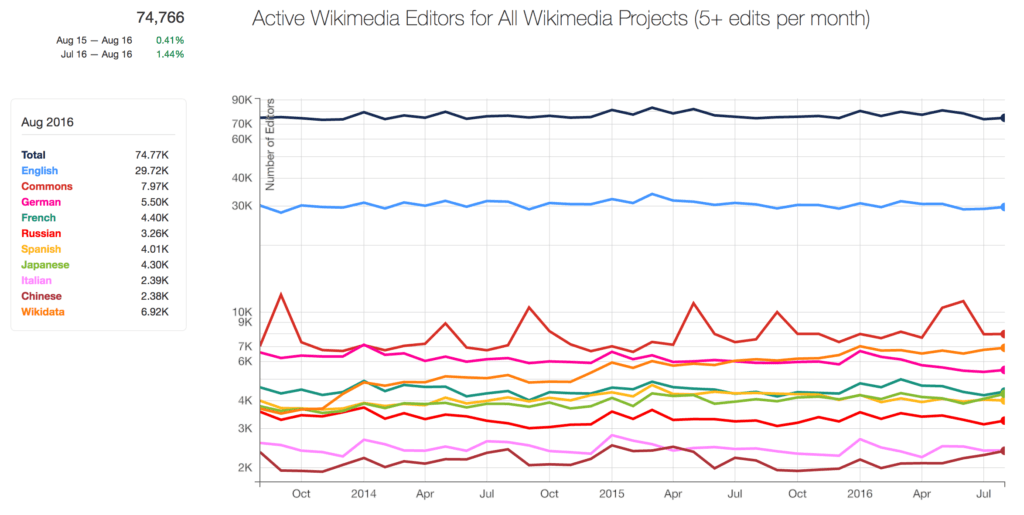

Value capture
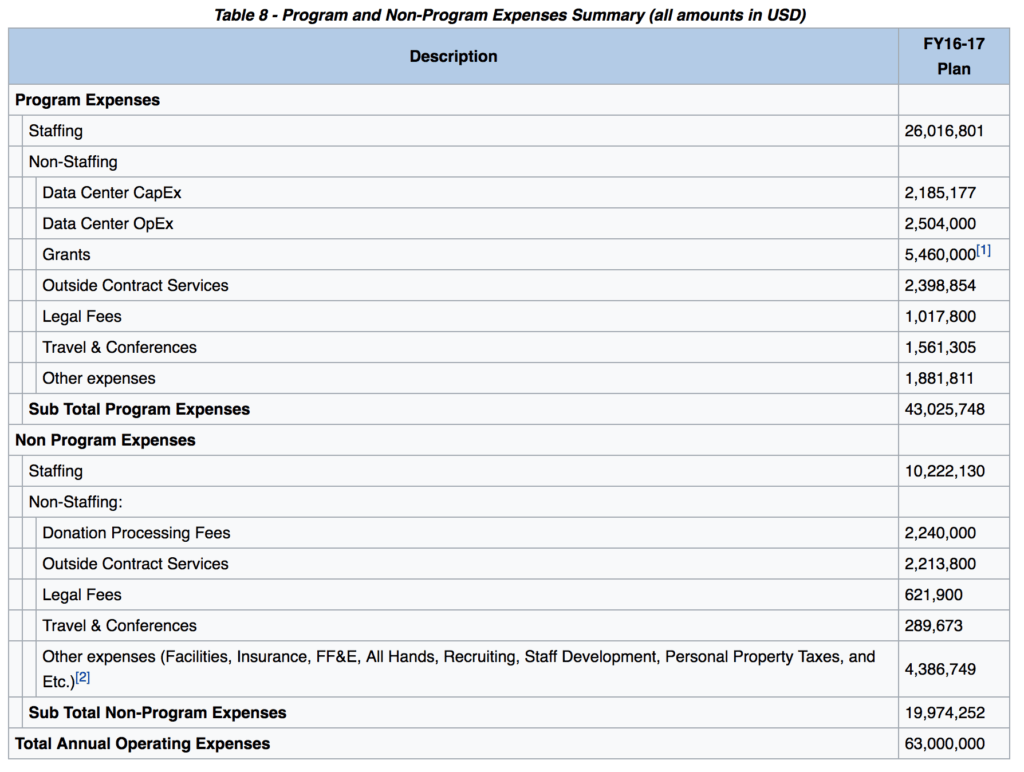
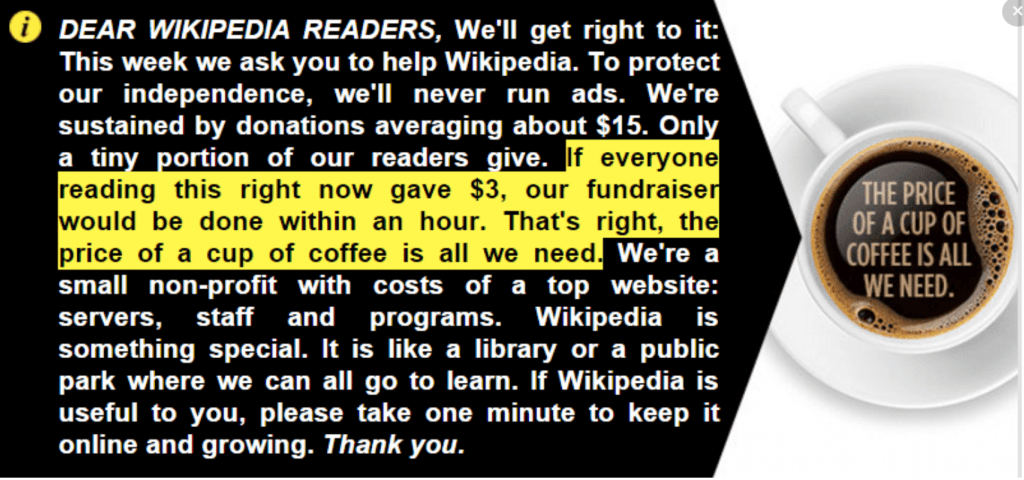
Future and growth potential
As the number of Internet users grows, Wikipedia will have to manage the crowd (editors) and ensure the quality of the information being put onto the platform. Few argue that the popularity of Wikipedia is on a decline with the evolution of Google ranking algorithm, and the emergence of other crowd-sourced websites like Quora.
It is believed and argued that by keeping the content free, Wikipedia is passing billions of dollars in revenue annually. Based on the page view stats published byWikipedia, it could make $2.3B through display advertisements, affiliate links, lead generation, email monetization, franchising, and premium accounts[11]. But Wikipedia has chosen to not make itself an advertising platform by putting it in its founding pillars[12]. This, however, poses a big risk and a daunting task for Wikipedia to raise enough funds to be able to continue serving its purpose.
Sources:
[1] http://reportcard.wmflabs.org/#secondary-graphs-tab
[2] https://en.wikipedia.org/wiki/List_of_most_popular_websites
[3] https://www.technologyreview.com/s/520446/the-decline-of-wikipedia/
[4] http://andreaforte.net/ForteBruckmanWhyPeopleWrite.pdf
[5] https://www.quora.com/Why-do-people-write-articles-for-Wikipedia-despite-they-dont-get-any-recognition-or-incentives
[6] http://www.economist.com/blogs/economist-explains/2013/05/economist-explains-who-really-runs-wikipedia
[7] https://medium.com/matter/the-36-people-who-run-wikipedia-21ecca70bcca#.ocsm5octj
[8] http://reportcard.wmflabs.org/
[9] https://meta.wikimedia.org/wiki/Wikimedia_Foundation_Annual_Plan/2016-2017/Final#Detailed_Budget:_FY_2016-17_annual_plan
[10] https://www.washingtonpost.com/news/the-intersect/wp/2015/12/02/wikipedia-has-a-ton-of-money-so-why-is-it-begging-you-to-donate-yours/?utm_term=.6cfb050cd766
[11] https://monetizepros.com/features/analysis-how-wikipedia-could-make-2-8-billion-in-annual-revenue/
[12] https://en.wikipedia.org/wiki/Wikipedia:Five_pillars



Great post, Mohit! I happen to be a frequent Wikipedia reader despite remembering my high school teachers always scolding that it’s “not a credible source.” I think it’s a difficult balance to have user generated content yet attempt to be consistently accurate. I have seen countless viral links of Wikipedia pages fraudulently edited with a “funny” change (https://www.buzzfeed.com/alanwhite/spectacular-acts-of-wikipedia-vandalism?utm_term=.vgzLLKQ67#.hnpMM5q6K). While most of these instances are, in fact, funny and probably harmless, I’m wondering whether you think Wikipedia will make add any additional layers of oversight given the recent attention being paid to “fake news.” I imagine as serious issues continue to be researched and discussed online, more malicious players may attempt to make more significant changes.
Christy – I agree that it indeed is really difficult for Wikipedia to balance crowdsourcing content from users and ensuring consistency. I think Wikipedia already has a good oversight structure in place. What will make it more efficient, to my mind, is automated checks using artificial intelligence and machine learning. In fact, Wikipedia today uses bots to correct basic spelling / grammar errors, etc. They can double down on the technology to notify the oversight team if inconsistent things are posted on a page, or if a page is illegitimately edited. Having said that, they can’t be 100% accurate and such instances will occur.
Do you think building a business model based on donations as large as $50M+ annually is sustainable for Wikipedia in the long term? Or should they actually start focusing on making enough revenues from advertising so as to be sustainable in the long term? What is the push back against running relevant ads that might actually help users?
Anish – I second your thoughts. In fact it goes back to what we were discussing the other day. How do they ensure enough funding as the number of people using internet rises and Wikipedia scales up?
I don’t think Wikipedia will start running ads – it is against their principles. Refer to the first of the five Wikipedia pillars on the following link:
https://en.wikipedia.org/wiki/Wikipedia:Five_pillars
It says “Wikipedia is not a soapbox, an advertising platform, a vanity press, an experiment in anarchy or democracy, an indiscriminate collection of information, or a web directory.” And I don’t think running ads on Wikipedia will help users. Google is already displaying ads, there’s no reason Wikipedia would want to compete with them in that space.
Next, they are managed by Wikimedia Foundation which is a non-profit organization aimed at distributing high-quality content for free. As long as Wikipedia stays under Wikimedia Foundation, I don’t think they will start charging readers or start displaying ads.
One potential source of revenue I can think of is premium model for corporations. That would mean figuring out additional value proposition on top of what Wikipedia already offers and charging the corporations for that (on subscription basis or pay per use basis). I don’t know if Wikipedia is already thinking in that direction.
What other sources of revenue can you think of?
You brought up Quora as a potential competitor for Wikipedia. Given the scale that Wikipedia has already achieved, do you really believe companies like Quora represent a credible challenge/threat to Wikipedia’s dominance? It feels like these other players cater to a more “shout-out” type of market for unanswered questions, but lack the depth and proper sourcing/referencing that Wikipedia has been able to put together.
@Techie – I like your perspective. Agree that Wikipedia’s scale is much bigger to worry about players like Quora but disruption always start that way. Quora is providing reputational advantage (in the online social space) to its contributors which Wikipedia is not providing. You don’t know who has contributed to the Wikipedia content unless you go to the history page to see the names. But Quora tells you who has contributed to it. Further, Quora takes votes from the readers who can up/down vote the responses. This helps the readers get to read the best / most relevant answers, which others are also reading. So more editors –> better content –> more readers –> (more advertisers and) more editors. Clearly a network effect game!
Agree that Quora’s current content is more in Q&A form and it lacks the depth and referencing information Wikipedia provides, but who knows Quora might decide to go there one day. Who in our generation would have thought we would switch so easily from Encyclopædia Britannica to Wikipedia? But it happened! 🙂
Great post – thank you for sharing! I still find it fascinating that people are willing to spend time adding and editing Wikipedia though they are not truly being incentivized to do so. It is also interesting that Wikipedia refuses to monetize using ads, as I do not believe ads would really disrupt the experience. I realize this is more of a political stance, but you have to wonder then what good they could do with money. They could donate a portion of it, or even employ their avid editing base!
Agree @HBSstudent11. This goes back to their philosophy of not letting ads feature on the platform. Who knows they might open up that stream of revenues.
Thanks Mohit for your post on Wikipedia – great post. I have always been fascinated (and surprised to be honest) by the fact that the people contributing to Wikipedia are doing so without getting rewarded for their work. I wonder if this does not create a bias that leads to wikipedia only cover mainstream, high-level knowledge. In my previous job, I could not put Wikipedia as a source on my slides because it was not considered as a ‘serious’ and ‘reliable’ source of knowledge.